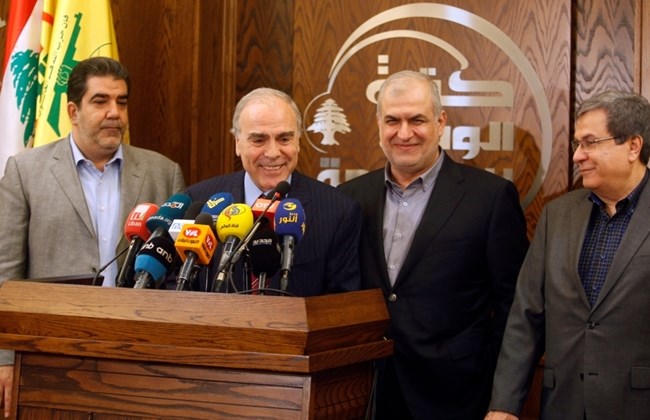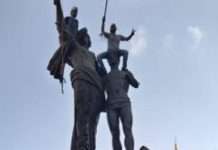Aoun’s presidential initiative hits dead end
Hussein Dakroub| The Daily Star/May. 21, 2015
BEIRUT: MP Michel Aoun’s latest initiative to resolve the yearlong presidential crisis appeared Wednesday to have reached a dead end, with the Future Movement, backed by its March 14 allies, opposing any constitutional amendment to allow for the president to be elected directly by the people. The development comes as MPs from Aoun’s Change and Reform bloc met Wednesday with lawmakers from Hezbollah and the Future Movement as part of an attempt to lobby parliamentary blocs on the Free Patriotic Movement leader’s presidential proposal. “There are no chances for the achievement of ideas proposed by Gen. Michel Aoun to end the presidential vacuum. The political, security, military and constitutional circumstances are not favorable to make any constitutional amendment,” Future MP Atef Majdalani told The Daily Star shortly after an FPM delegation met with some members of the Future bloc headed by former Prime Minister Fouad Siniora.
“We are committed to the Taif Accord and the Constitution. Gen. Aoun’s ideas calling for the election of the president by the people do not exist in the Constitution, which enables lawmakers to elect the president,” he said.
Majdalani, who was among Future MPs attending the meeting with the FPM delegation, said the election of a president by the people, as demanded by Aoun, requires an amendment of the Constitution. “This move will lead to changing the current system into a presidential system,” he said. Speaking to reporters after the meeting with the FPM delegation, Future MP Ahmad Fatfat said: “The bloc will carefully study Gen. Aoun’s initiative on the basis of the Taif Accord and the inability to amend the Constitution at the present stage.”
MP Alain Aoun from Michel Aoun’s parliamentary Change and Reform bloc said the FPM delegation had “very frank dialogue” with the Future MPs. He added that the concerns of the two sides would allow for attempts to bridge differences over “certain issues” regarding Lebanon’s presidential crisis, the appointment of military and security chiefs, and the drafting of a new election law.
Asked to comment on Tuesday’s statement by the Future bloc on the need to implement the Taif Accord, Alain Aoun said: “We are in agreement with the Future bloc on the implementation of the Taif. No one is demanding a change to the Constitution, or even abolishing the Taif. But the Christians’ problem with the Taif was in the way it had been implemented in the part that called for equal power sharing [between Muslims and Christians].”
Michel Aoun’s initiative was dismissed Tuesday by Kataeb Party leader Amine Gemayel after meeting Speaker Nabih Berri, who was quoted as saying that the FPM leader’s proposal requires a constitutional amendment. Aoun proposed four options to solve the presidential crisis: In the first a president could be elected directly by the people in two rounds of voting, first by Christians, and then by all Lebanese. The second would see a popular referendum being held to know who among the presidential candidates enjoys the most support. The winner would then be elected president by Parliament. The third option allows Parliament to hold an election in which one or two of its most popular Maronite MPs would stand as candidates. And the fourth alternative has a new Parliament elected based on a new electoral law that is more representative of the people, and then lawmakers would in turn choose a president.
Hezbollah welcomed Aoun’s proposal. “Aoun’s initiative offered realistic solutions,” head of Hezbollah’s parliamentary bloc Mohammad Raad told reporters after meeting with the FPM delegation. “Seriously considering the solutions [proposed by Aoun] could lead to a solution to the crisis,” he added. The FPM delegation also met for the same purpose with former Prime Minister Najib Mikati. Speaking after the meeting, MP Ibrahim Kanaan from Aoun’s bloc said: “We are not proposing a constitutional amendment or an amendment of the National Accord Document [Taif Accord]. We are only proposing four solutions to a big and intractable crisis based on a referendum, meaning a return to the people.”
Meanwhile, Berri dismissed speculation of an emerging political rift with Aoun, saying that the differences between the two were related to administrative manners. He was quoted by lawmakers who visited him at his Ain al-Tineh residence as saying that there is no “strategic dispute” with Aoun. The current differences between the two relate to “assessing some interests in state administration,” Berri added. With regard to the appointment of military and security chiefs, Berri reiterated his support for the appointment of new officials, but said that he would support the extension of Army and police chiefs if political parties failed to agree on new appointments. Aoun called on the government Tuesday to carry out security and military appointments, warning against the extension of the terms of incumbent officers.
Interior Minister Nouhad Machnouk is scheduled to meet Aoun Thursday to discuss with him the issue of security and military appointments. Education Minister Elias Bou Saab, one of three ministers representing Aoun’s bloc in the Cabinet, said the trio will not resign over the issue of security and military appointments. “We tell them that no one can ignore the opinion of the other side. It is not a matter of resignation or not. The Cabinet has responsibilities it must shoulder,” Bou Saab told reporters before attending a Cabinet session Wednesday. “If the Cabinet fails to shoulder its responsibilities in the issue of Arsal, the situation will not be as it was before: sidestepping a divisive issue to move to another issue. No other issue will be decided before the divisive issue is resolved,” he added. Aoun called on the government and the Lebanese Army to oust Islamist militants holed up on the outskirts of the northeastern town of Arsal.


















